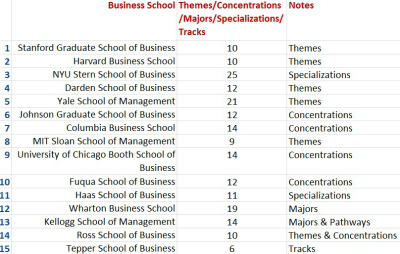Schools measure your preparedness and research by analyzing how you quote the curriculum. The ‘Why MBA’ question needs a few lines dedicated to the specificity of the program. Here are a few pointers worth considering before you include curriculum details:
1) Curriculum Structure
General Management programs – Harvard, Stanford, Darden, and Haas, have continued the tradition of building the foundational knowledge in the core courses with the coverage of traditional management topics – Accounting, Finance, Marketing, Operations, Leadership and Strategy, followed by 2nd year specialization either in the form of concentrations, specialization, themes or tracks.
In concentrations, the admission team has divided the electives into broader categories so that the candidates will have a structure in 2nd year when they choose the electives. Most General Management MBA programs will give the option to pick electives without specialization. Stanford has General Management as an Area of interest. If you want a leadership role post-MBA, taking a group of courses with strong General Management focus would be ideal. For career switchers, interested in a job function, choosing specialization is mandatory.
More Curriculum Analysis with Winning MBA Essay Guide
2) Feasibility
During our consulting service, we get questions on whether switching industry is easy. And if so how to quote the curriculum. The answer is a little tricky. Despite the school’s nimbleness in changing the curriculum, most recruitment in diverse industries happens in top tier schools (top 10). Any school outside the ranking will have a tough time placing candidates in niche industries.
Location of the school is another factor. If the school is in a state/city/country known for Automobile/Aerospace/Manufacturing/Winery/Fashion/Sports, attracting recruiters is easy as the logistical challenges are limited and the career service team would have already established a relationship with the recruiters.
If the school’s curriculum has a track or concentrations in the niche industry, it is safe to assume that the career service team is actively searching for recruiters in the industry. Despite the best efforts of the team, we have seen the school in tier-2 struggling to find opportunities in niche sectors.
For essays, you can quote the concentration/track, but in reality, it would be much tougher to make the switch.
There is another reason.
The best pay packages are offered in Consulting, Finance, and Technology.
Overall Business School ranking depends on post-MBA salary. It is unlikely that the school would dedicate their placement efforts on industries where the salary falls below the median of the class. That is why few candidates choose non-profit or Entrepreneurship (start-up) opportunities, post-MBA. Additional pressure from peers to choose the most lucrative career path is not easy to withstand despite moving accounts of impact and change narrated in essays.
Most MBA candidates who pursue non-traditional goals do it on their own terms without involving the career service team. Some Employment reports exclude students seeking Entrepreneurial opportunities from the final data to avoid impact on their post-MBA salary data.
If you are an Entrepreneurial applicant, first define what Entrepreneurship is for you, before pursuing an MBA.
3) Electives and Curriculum Customizability
1-Year MBA program is not a direct threat to the traditional 2-year MBA programs in the top 10 rankings, but the poaching of talents from the application pool has forced the US schools in the 10-30 ranking to bring customizability in the first year itself. McCombs MBA, for instance, has a flexible core with work and leadership experience integrated in the first year itself. The only top MBA program, offering core elective is MIT Sloan. The Full-time MBA gives students elective option in Managerial Finance, Intro to Operations, Marketing Management, and Competitive Strategy.
Electives are a big part of the MBA experience. The real learning happens in the 2nd year. Most schools have concentrations/majors/themes/tracks/specializations in the 10-15 range. MBA program with majors/tracks will mention that explicitly in the certificate. Always remember, in an economic downturn, specialists are preferred over a generalist. Post-1980, we have a cyclic boom and bust in the economy, every 10 years. Prepare for the worst, and choose a specialization if you have found a career path.
Here is a snapshot of the themes/concentrations/majors/specializations/tracks for the top 15 MBA programs in the US 
Read Ultimate Guide for details
4) Experiential Learning
Second to internship, what makes MBA program withstand the bubbles and busts is the emphasis on offering experiential learning opportunities. Schools in New York (Stern, Columbia, and Cornell) have taken advantage of the financial centers and the concentration of the Media industry with lecture series, seminars, industry visits, and networking around the City. In addition to reducing travel time, most candidates choose the program with New York as a clear post-MBA location.
For other schools with strength in consulting (Kellogg, Harvard, and Stanford), the emphasis is on Global Experiential learning. Most likely, a Management Consultant will have to dedicate 60-65% of their time traveling to a client location and work in an unfamiliar environment. Therefore, it makes sense to train the candidate to travel and work on tight deadlines.
Close to half of Kellogg's Full-time and Part-time MBA students participate in the annual Global Initiatives in Management (GIM) where the students have to travel to an international location and spend close to 2-weeks interacting with government officials, and business leaders while developing a deeper understanding of the problem they are trying to solve.
At Stanford, Global Management Immersion Experience (GMIX), takes students to the client location in a new industry they are likely to work post-MBA and experience the culture. Harvard takes the meaning of experiential learning quite literally with the FIELD Global Immersions where students have to develop a product or service in collaboration with a partner organization. The variations are many for top MBA programs with each school bringing its own unique touch to the experience Understanding the differences is important to quote them in the essay.
5) Internships
For 2-year MBA programs, almost all candidates choose internships unless they are pursuing an Entrepreneurial path. Instead of plainly mentioning internship opportunities in essays, dig deep and find the conversion rate and performance data.
1) What percentage of internships converts to a full-time offer?
2) Which industry is the most popular in internships?
3) What function is the most popular in internships?
4) Which Employer has a long-standing reputation of picking the most interns?
Mention the industry/function for internships. If you have chosen Consulting, most likely you will be working for a non-profit and hone your consulting skills. But if you are planning to switch careers into Finance, an internship is an excellent route to full-time offers. Specify the preferred employer by analyzing the latest Employment report.
6) One Paragraph vs. Spreading Out
When we review essays, the biggest challenge has been spreading the curriculum mentions across the essay. We can’t blame the applicants. The first part of the ‘Why MBA’ questions will always involve motivation.
Applicants dedicate the opening paragraph on interesting life stories to connect with ‘Why MBA’ now. When the applicant switches the narrative to the specifics of the curriculum, they list out the most relevant part of the program, without thinking about the narrative. The result is an interesting first paragraph and then a list of courses/experiential learning they like. That is not what the admission team is expecting. You have to use elements of storytelling equally while mentioning curriculum. It is tricky, but we can help you with our Essay Review Service.
Related Services
• Essay Review
• Essay Editing
• Consulting (Initial Free)
Related Books
• Ultimate Guide
• Winning MBA Essay Guide
